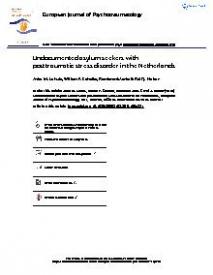Undocumented asylum seekers with posttraumatic stress disorder in the Netherlands
Background: To date, most studies on the mental health of refugees in Europe have focused on the prevalence and treatment of psychopathology. Little is known about those who illegally reside in the host country, referred to, in the Netherlands, as undocumented asylum seekers. There are indications that mental health and psychosocial problems are more prevalent in this group than among refugees in general, with unsatisfactory treatment outcomes.
Objective: To describe characteristics and mental health and psychosocial problems of undocumented asylum seekers, and to establish the need for, and feasibility of, a tailored treatment approach.
Method: Based on a literature review and extensive clinical experience, common mental health and psychosocial problems and accessibility of care for undocumented asylum seekers are established, as well as the common treatment approach in the Netherlands. A tailored treatment programme and experiences with its implementation are described.
Results: Mental health and psychosocial problems are highly prevalent among undocumented asylum seekers, and access to care is limited. In addition, treatment in the Netherlands, if provided, is mostly insufficient yet prolonged. Given the specific psychosocial problems and living conditions of undocumented asylum seekers, a necessary criterion to enable adequate and evidence-based treatment provision is acknowledgement of their distinct needs. A tailored treatment programme as currently implemented in the Netherlands appears to meet this criterion and be feasible under certain conditions. Collaboration between mental health care providers and involved social service and governmental parties by regular meetings, though complicated, is a relevant element.
Conclusions: Even though undocumented asylum seekers are illegally residing in a country, medical ethics and the human rights perspective necessitate for adequate and evidencebased treatment for those among them with mental health problems. The tailored treatment approach presented here suggests that, notwithstanding factors complicating care provision which require specific attention, this is feasible.
HGHLIGHTS
• Mental health and psychosocial problems are highly prevalent among undocumented asylum seekers, but they lack the right care.
• Viewed from both a medical-ethical and a human rights perspective, state-of-the-art treatment should be provided.
• A proposed treatment model suggests that, notwithstanding complicating factors which require specific attention and attitude, this is feasible.
• Collaboration between mental health care providers, social services and governmental parties is a relevant element.
Geachte bezoeker,
De informatie die u nu opvraagt, kan door psychotraumanet niet aan u worden getoond. Dit kan verschillende redenen hebben,
waarvan (bescherming van het) auteursrecht de meeste voorkomende is. Wanneer het mogelijk is om u door te verwijzen naar de bron
van deze informatie, dan ziet u hier onder een link naar die plek.
Als er geen link staat, kunt u contact opnemen met de bibliotheek,
die u verder op weg kan helpen.
Met vriendelijke groet,
Het psychotraumanet-team.
In: European Journal of Psychotraumatology, ISSN 2000-8066 | 10 | 1 | 1605281
https://www.tandfonline.com/doi/full/10.1080/20008198.2019.1605281


